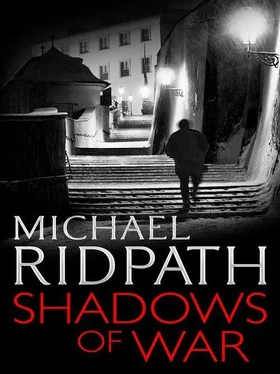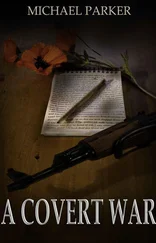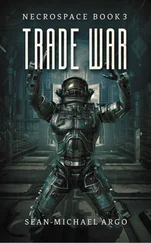‘No,’ said Conrad. He knew his father hadn’t mentioned the British secret service’s suspicion of Theo, and Conrad had decided not to pass on van Gils’s theory about Constance. It would distress his mother and he wanted to speak to his father about Constance first. ‘The Dutch intelligence people are saying it was the Germans, but they don’t really know. Where’s Father?’
‘He’s dining at the club tonight. Reggie’s up in town from Chilton Coombe. He’ll be back for dinner. And Charlotte is staying as well for a few days. She has brought Mattie.’
‘I’m glad to hear that. I haven’t seen them since Millie died.’ Charlotte would be good for his mother, as would her son Matthew, on whom Lady Oakford doted. And it would be good for Conrad to see his brother and sister too, the living ones. He hoped he would have the patience to tolerate the crass comments that he knew Reggie would let drop. It was his father who would be the really difficult one to talk to. Conrad wasn’t sure he could ever forgive him for what he had done. But he would have to at least pretend to, for his mother’s sake.
And he knew his father; Millie’s death would be eating him up. Despite his anger with him, Conrad couldn’t help feeling a sliver of sympathy.
‘There’s someone else here to see you,’ his mother said. ‘Anneliese. She came about an hour ago. We had a lovely talk. It was so nice to be able to speak to someone about my daughter in German.’
Conrad smiled. ‘She liked Millie.’
‘She’s in the drawing room,’ said Lady Oakford. ‘I think she has things she wants to tell you. I’ll leave you alone.’
Conrad went into the drawing room where Anneliese was curled up on a sofa by the window. It was a shock to see her, in his own house, looking so delectable. She was wearing a skirt and green blouse Conrad recognized from their days in Berlin; it brought back all those days, and nights, spent together. She smiled brightly when she saw him, a warm, amused smile at once familiar and yet unseen during the past year.
‘Any luck?’ she asked.
‘I hope so,’ said Conrad. ‘We’ll see. At least I know now that Theo didn’t kill Millie.’
‘I’m so glad to hear that,’ she said. ‘As must you be.’
Conrad moved towards the drinks tray. ‘I really need a drink. Do you want one?’
‘Why not? A gin and It, please.’
Conrad poured her one, and himself a whisky and soda. He wanted to sit on the sofa next to Anneliese, but decided she might prefer some distance, and so took an armchair.
‘I’ve been busy too,’ said Anneliese. ‘I’ve visited the Russian Tea Rooms. Twice.’
‘Did you meet Constance Scott-Dunton?’
‘I did the second time. The first time I went was Tuesday. I spoke to a girl called Marjorie Copthorne. I told her I was a German, that I was living here with my family, and that I was stuck in this country because of the war. I made out I was a committed Nazi and I had heard that the Tea Rooms had English people who were sympathetic to modern Germany. So I had come there to meet some of them. Marjorie had all sorts of questions about Germany, which of course I could answer.’
‘Did she believe you?’
‘She did. But then a Russian woman sat with us. Her name was Anna Wolkoff; she is the daughter of the owner. She asked me right away if I was Jewish; she claimed I looked Jewish. She said that she had become an expert in Russia at identifying Jews.’
Anneliese didn’t look particularly Jewish to Conrad, but then he had never set himself up as an expert on racial matters. ‘What did you say?’
‘I said my father was an atheist who was racially Jewish, but my mother was Christian and so was I. I told them I hated my father for running away from our country, and I wanted to return to Germany, but my parents insisted I work in London to pay for their keep. I was planning to return anyway, if the German authorities would let me back in, when the war broke out.’
Conrad raised his eyebrows. Like all good lies, the story had an element of truth to it, but knowing Anneliese, she must have found it painful to publicly denounce her father, for whom she had done so much.
‘I know,’ said Anneliese, noticing Conrad’s reaction. ‘I didn’t like it. But I almost convinced Anna and I definitely convinced Marjorie. So I decided to have another go. I returned to the Tea Rooms last night, and this time I met Constance Scott-Dunton.’
‘What did you think of her?’
‘You are right, she is queer. I mean, she is lively and friendly, but she has such intense dark eyes, they unsettle me. She seemed to like my stories of modern Berlin. Then Anna Wolkoff arrived again, with a good-looking American man named Kent, I think. She was clearly still suspicious of me.’
‘I assume Constance didn’t tell you about her trip to Holland?’ Conrad asked. Even Anneliese couldn’t get that out of a stranger on first meeting.
‘No. But I did talk to her about Henry Alston and Captain Maule Ramsay. I had read back copies of the newspapers in the Golders Green Library with my father to learn something about their backgrounds. It turns out that Marjorie is the niece of a good friend of Alston, and that she introduced Constance to him. Constance seems to think that Alston is a great man. It was almost as if she was in love with him, although he has a terribly damaged face, doesn’t he?’
‘He does,’ said Conrad. ‘Attacked by a lion in Africa, I believe. He’s clever; my father has always had a great deal of respect for him. They are both directors of Gurney Kroheim.’
‘From what Constance says, Alston is a strong supporter of Germany. As is the other one, Captain Maule Ramsay, although he is much more blatant about it. I said how pleased I was to hear that some British politicians had sensible views.’ Anneliese shuddered. ‘I think she likes me.’
‘The policeman I met in The Hague thinks she might have murdered Millie.’
‘Really?’ Anneliese eyes opened wide. ‘Does he have proof?’
‘Some. Not enough. The knife that was used to stab Millie was taken from the kitchen of the hotel she and Constance were staying in. Also, it appears Constance lied to Millie about Theo wanting to meet her in the sand dunes. And the policeman thinks she lied to him about seeing Theo leaving the scene of the murder.’
‘Sounds pretty clear evidence to me,’ said Anneliese. ‘Why didn’t he arrest her?’
‘He was told to send her back to England. Dutch intelligence are convinced Theo killed her. Or at least that’s what they say.’
‘Did the policeman have any idea why she would want to kill Millie?’
‘No. And that’s the key question. Perhaps you can find out?’
‘Perhaps I can.’ Anneliese frowned. ‘It’s strange to see Nazis again. Oh, I know they might not strictly speaking be Nazis, but it reminded me of the attitude of so many Germans. It’s odd how a hatred of the Jews seems to nourish people like that. It’s almost as if they thrive on it; they feed off hatred to sustain their political views, give them some shape.’
‘I’m sorry you had to pretend to think like them,’ said Conrad.
‘That’s all right,’ said Anneliese. ‘I mean, it is a vile way to think, or even to pretend to think, but it feels good to be able to do something to stop those people. It’s better standing up to them, even claiming to be one of them, than denying that they exist or that they matter.’
‘You don’t have to see them again if you can’t face it,’ said Conrad.
‘You want to find out what happened to Millie and you think Constance knows?’
‘That’s right,’ said Conrad.
‘Well, in that case I will get her to tell me. It might take a while, but she will trust me eventually.’
Читать дальше












